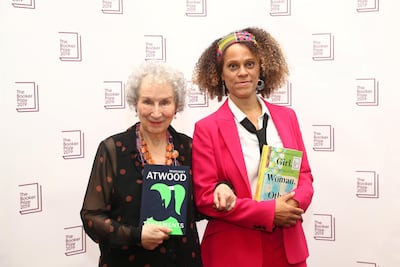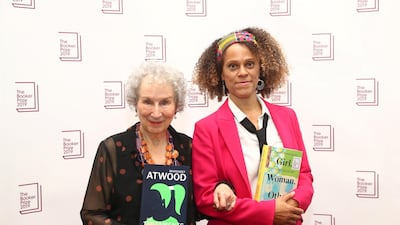It's the United Kingdom's foremost literary award, but this year the fame and success afforded to the Booker Prize winners have been somewhat overshadowed.
The controversy comes from the prize being awarded not to one winner, but two: Margaret Atwood and Bernardine Evaristo. It seems like an innocent decision to break from usual tradition and honour two worthy winners, right? Well, apparently not.
This is the first time in almost three decades that the prestigious literary prize was awarded to two writers, and for good reason.
The last time the prize was split was in 1992, when it was shared by Michael Ondaatje and Barry Unsworth. The next year, in 1993, a rule was rushed in to forbid jurors from awarding it to more than one winner again. It had only been split once before that – in 1974 between Stanley Middleton and Nadine Gordimer.

So, 26 years later, after deliberations that lasted five hours and a firm decision by judges that there was simply no other way but to split the award, breaking the rules is kind of a big deal.
The judges knew this all too well. It's believed that their five-hour deliberation session culminated in something of a sit-in protest that ended in a call to the chair of trustees, Baroness Helena Kennedy, before announcing the award would be shared.
“We were told quite firmly that the rules state we can only have one winner," said Peter Florence, chairman of the judges, at a ceremony at London’s Guildhall on Monday evening.
"Our consensus was that it was our decision to flout the rules and divide this year’s prize to celebrate two winners.
"These are two books we started not wanting to give up and the more we talked about them the more we treasured both of them and wanted them both as winners. We couldn’t separate them.
“But the more we talked about it, having two winners seemed the only fair representation of our deliberations, which was why we felt the rules were inadequate to the problem we had been given.
“We tried voting, that didn’t work. There’s a metaphor for our times.”
The shock double award almost overshadowed the fact that both authors made history in winning this year, and not just because of the prize being split. At 79, Atwood becomes its oldest winner, and Evaristo is the first black woman to win.
Atwood won this year for her book The Testaments, a sequel to her well-known title The Handmaid's Tale. The Testaments, which was published last month, was widely considered the favourite to win the award.
It is the second time the Canadian author had won the prize.
She won in 2000 with The Blind Assassin, and has been shortlisted for four other books: The Handmaid's Tale (1986), Cat's Eye (1989), Alias Grace (1996) and Oryx and Crake (2003).
British author Evaristo won the award with Girl, Woman, Other, which tells the stories of 12 characters, mainly female and black and aged 19 to 93, living in Britain.
The winners will now split the £50,000 (Dh232,585) prize money.
“Neither of us expected to win this and I’m very happy that we’ve both got curly hair," Atwood said while accepting the award. "I’m very surprised. I would have been thought that I would have been too elderly.”
Evaristo said: “I will say I’m the first black woman to win this prize and I hope that honour doesn’t last too long. I hope other people come forward now.”

